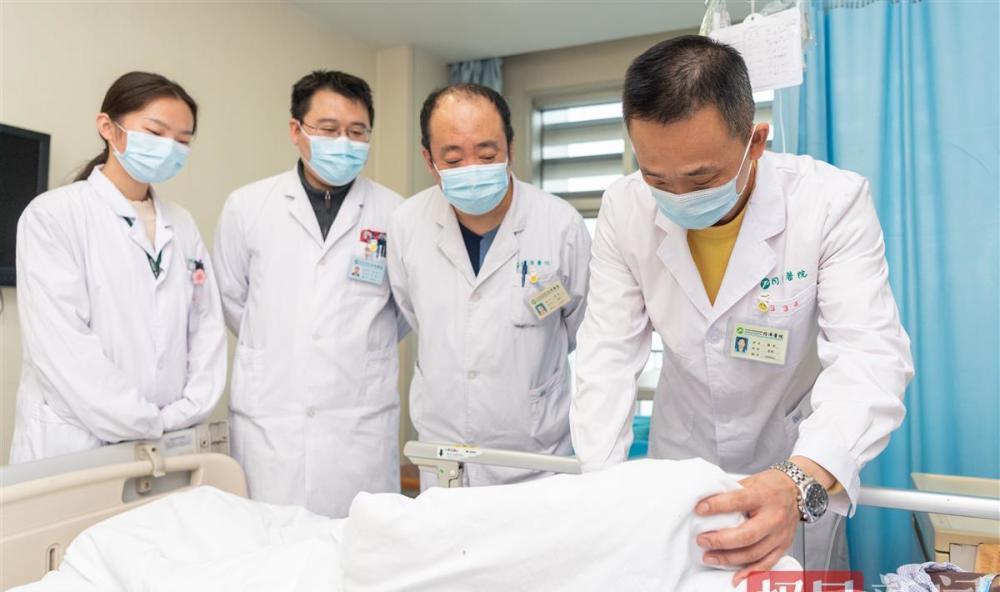Jimu news reporter Li Manying
Correspondent Chang Yu
Photography By Tao Jidong
Panda blood patients appear comatose, do not change the liver can only survive for two or three days, the doctor overnight contact to prepare blood and do a good job of blood program. On January 7, the patient underwent an emergency liver transplant at Tongji Hospital of Huazhong University of Science and Technology, and after careful postoperative treatment, on January 27, she was preparing to be discharged from the hospital to reunite with her family.
Ms. Shen, 62, thinks she is in good health and has never known she has hepatitis B, so she has never received treatment. In mid-December 2021, he was hospitalized for ongoing fever and found that he had entered the advanced stage of liver cirrhosis and was a panda blood. After half a month of hospitalization, Ms. Shen had a serious complication - liver coma, and after treatment with artificial liver, there was still no significant improvement. The family learned that liver transplantation could save the lives of the elderly, so they registered for liver transplantation and quickly transferred to Tongji Hospital.

On January 6, 2022, Ms. Shen's condition took a sharp turn for the worse, not only the jaundice progressively increased, the coagulation function became worse and worse, but also she was unconscious. "You must do a liver transplant immediately, otherwise you can only live for two to three more days," Wei Lai, chief physician of the Organ Transplant Research Institute of Tongji Hospital, told the family helplessly.
"It's time to do a transplant!" On the evening of the 6th, the good news suddenly came, and the Chinese organ allocation system library quickly matched her with the right liver. But after a brief moment of joy, Ms. Shen's son had new worries.
"Donor liver is not rh-negative blood like my mother's, but positive, will this lead to severe rejection?" Will there be serious complications from such a blood transfusion during surgery? Will the surgery be successful? How long can I live after surgery? "There is no chance of survival without transplantation, but transplantation seems to be not small risky, and Ms. Shen's son is distraught." Facing the attending doctor, I couldn't help but crackle and ask a long list of questions.
"Don't worry, RH-positive trans-blood type transplants are now very mature." While comforting the family, the attending doctor Wei Lai answered the surgical plan and postoperative medication plan for liver transplantation in RH-negative patients, and introduced the successful case, eliminating the concerns of the patient's son; he immediately contacted the transfusion department and the operating room to make preoperative preparations.
Rh-negative O blood accounts for only one in a thousand in the population, and the blood bank is not sufficient. The transfusionist immediately contacted the central blood station to prepare blood products such as red blood cells and plasma for the patient, and the autologous blood return transfusion device during the operation was also prepared to minimize the input of foreign blood.
Everything was ready, and at 9 a.m. on January 7, Ms. Shen was pushed into the operating room. After 6 hours of intense surgery, the new liver began to work smoothly in the patient's body.
"The operation went well, only 4 units (800ml) of red blood cells were lost, don't worry about hemolysis!" Walking out of the operating room, Dr. Wei smiled and said to the family. Only then did the big stone in the hearts of the family members be put down.
On the first day after the operation, Ms. Shen woke up, learned that she had a liver transplant, and said that "it felt like a dream."
After more than a week of treatment, Ms. Shen's physical condition has been basically normal. "Not only has the hepatitis B virus been thoroughly controlled, but the new liver works well in the patient's body without problems with hemolysis and rejection." Dr. Wei introduced.
"Thank you, we can finally have a reunion year." Ms. Shen's family is full of gratitude.